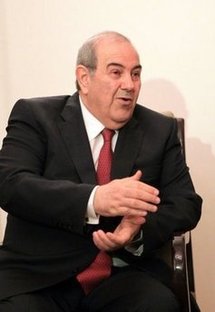Iraq election winner Allawi says new polls may be needed
Arthur MacMillan
BAGHDAD, Arthur MacMillan- Iraq's general election winner Iyad Allawi on Wednesday said new parliamentary polls run by international monitors might be needed to end concerted efforts from rivals who want to reverse his victory.
A statement from Allawi's Iraqiya coalition said it had considered asking the United Nations, the European Union, and the Arab League to intervene amid bitter recriminations that have blocked the democratic progress since the March 7 vote.

Iraq's general election winner and former premier Iyad Allawi during a meeting in Cairo
The former premier was in Egypt on Wednesday, where he met President Hosni Mubarak in Sharm el-Sheikh and later Arab League chief Amr Mussa in the pan-Arab organisation's Cairo headquarters.
Allawi told reporters after the Cairo meeting that he asked the Arab League to intervene with the UN to end his country's stalemate. He said he did not have detailed talks with Mubarak, who performed an open surgery last month.
"We asked the Arab League to intervene with the UN to help Iraq get past this trial," he said. "We hope for a legal implementation of the elections," without elaborating.
Iraqiya's strong backing in Sunni Arab areas allowed Allawi, a Shiite, to defeat incumbent Prime Minister Nuri al-Maliki, also Shiite, 91 seats to 89, according to unofficial results.
Both need 163 seats to form a majority government but coalition talks with smaller parties appear to have stalled, leaving the country far from ready to seat a new government.
The Baghdad recount, which has yet to get under way, followed an appeal by Maliki on the grounds that electoral violations cost him votes.
Iraqiya leaders said they would send a letter to the head of Iraq's top court, the Supreme Judicial Council, "stressing the urgency of his intervention to protect the judiciary from political influence, as this may have serious ramifications on the stability of the country".
At the centre of the dispute is the Justice and Accountability committee (JAC), chaired by former deputy prime minister Ahmed Chalabi, who won a seat in last month's election and is a leading member of a rival coalition.
"We have fears that this committee is trying to obstruct the formation of the next parliament, through continuing its random eradication policy, without proof and without taking people to court," Allawi told Sharqiya television.
The same committee's executive chairman is Ali al-Lami, a Chalabi ally who failed to win a seat.
"It works without legal and constitutional cover, and this is not allowable in Iraq or any country that respects the independence of judicial authorities," Allawi added.
Iraqiya said it had "examined the option of resorting to the international community", including the members of the (UN) Security Council, EU, and states of the Arab League "to exercise their moral and legal right over the protection of the political process from any injustices and to form a caretaker government and repeat the elections in an environment free of any political manipulation".
Such intervention would be feasible as Iraq remains under the reach of Chapter Seven of the UN charter, which sets out the Security Council's powers to maintain peace. Iraq was put into Chapter Seven status after now executed dictator Saddam Hussein invaded Kuwait in 1990.
An election official late Tuesday said a ruling on whether a further nine election-winning candidates would be disqualified had been postponed until next week, in another hold-up. The candidates are variously accused of links to Saddam's outlawed Baath party and military units during his reign.
US Secretary of State Hillary Clinton on Tuesday urged Iraqi leaders to resolve their rows and form a new government quickly.
The lack of a government almost seven weeks after the election has alarmed Washington, which plans to withdraw all combat troops from Iraq by August, ahead of a complete US military pullout at the end of 2011.
-----------------------------------------------------------------------------------